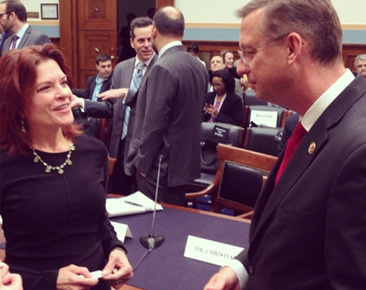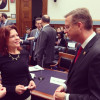
 Talented performers are leaving the music business because U.S. copyright provisions don’t allow them to make an adequate living, country music artist Rosanne Cash told a House Judiciary Committee panel Wednesday in Washington.
Talented performers are leaving the music business because U.S. copyright provisions don’t allow them to make an adequate living, country music artist Rosanne Cash told a House Judiciary Committee panel Wednesday in Washington.
Cash was one of a handful of music industry professionals testifying about the need to update U.S. copyright laws. “I see young musicians give up their dreams every single day because they can not make a living,” she told a subcommittee investigating the need to update copyright law and royalty payments.
Cash’s father, country superstar Johnny Cash, was one of the key witnesses before Congress when the last major copyright changes were made in 1997. But some of the same issues that weren’t addressed then are still problems now, the younger Cash testified.
Among the issues:
- AM and FM radio stations don’t have to pay performance royalties to artists when their songs get played. Songwriters get the royalty, but artists don’t. The original idea was that artists get exposure when their songs get played, but that argument seems diluted now that satellite radio pays performance to both songwriters and artists.
- Digital streaming services pay much lower rates. Cash said that during a recent 18-month period, her songs streamed 600,000 times on one digital music service. She received a royalty check for $114. But music service reps say that comparisons to the standard royalties aren’t valid. A songwriter gets 9.1 cents per unit sold, no matter how many times the purchaser plays the song, but the same writer earns money every time the song is streamed, albeit a fraction of a cent.
- Gaps in the copyright law treat pre-1972 works differently than those created since then. The pre-1972 recording aren’t covered by U.S copyright laws. So, for instance, the original recording of Blue Moon of Kentucky by Bill Monroe doesn’t earn federal performance royalties, but a current recording by my band, the No Names, would earn a payment.
But the testimony of Cash and others was countered by radio stations and music services. Charles Warfield, testifying for the National Association of Broadcasters, said forcing terrestrial radio stations to pay performance royalties to artists would create “severe financial difficulties” for many stations.
And Chris Harrison, a vice president for Pandora, said 70% of the digital music service’s revenues already were paid out as royalties and that paying out more wouldn’t be viable.
While the hearing provided a forum to air a number of vital issues, a divided Congress isn’t likely to make sweeping changes to U.S. copyright law any time soon.
The best chance for a performance royalty for artists vaporized late last year when the main sponsor of legislation to enact the payment, Rep. Mel Watt (D-N.C.), left Congress for a high-profile job in the Obama administration.







